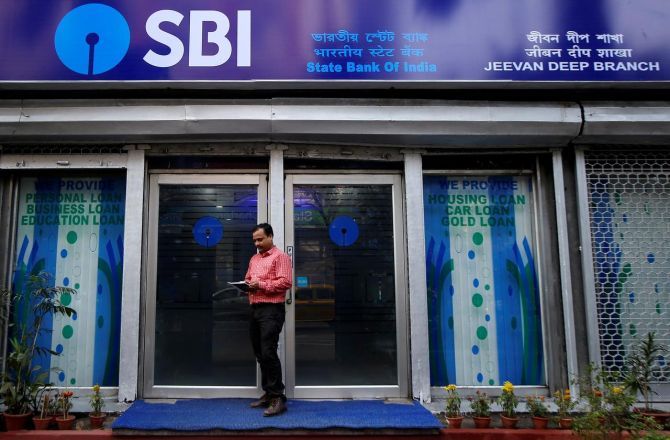The bank will give 3.25 per cent interest on savings bank deposits with a balance exceeding Rs 100,000. At present, the interest rate is 3.5 per cent.

Savings bank account holders in SBI having more than Rs 100,000 balance will earn a quarter percentage point less interest from Wednesday with the country's largest lender linking the interest rate to the RBI's repo or short-term lending rate.
However, SBI savings bank account holders with less than Rs 1 lakh balance will continue to get 3.5 per cent interest on deposits.
According to the information provided on the website of State Bank of India (SBI), the interest rate on savings bank accounts with balances above Rs 100,000 will be 2.75 per cent below the RBI's repo rate, which currently stands at 6 per cent.
Hence, the SBI will give 3.25 per cent interest on savings bank deposits with a balance exceeding Rs 100,000.
At present, the interest rate is 3.5 per cent.
The interest is paid quarterly.
The interest rate on such balances will go up in case the Reserve Bank hikes repo rate (the rate at which it lends to banks) and may fall further if the repo rate continues its downward journey.
The SBI, which controls nearly a quarter of the banking system, was giving interest at a rate of 3.5 per cent for savings bank deposits up to Rs 1 crore and 4 per cent for deposits above Rs 1 crore till Tuesday (April 30).
Earlier in March, the SBI had announced that it will be linking its savings deposits rates and short-term loans to the RBI's repo rate from May 1 with an aim to ensure faster monetary transmission.
The bank further said all cash credit accounts and overdrafts with limits above Rs 100,000 will also be linked to the benchmark policy rate, plus a spread of 2.25 per cent.
"The Risk premiums over and above this floor rate would be based on the risk profile of the borrowers, as is the current practice," according to its website.
SBI's domestic savings bank deposits stood at more than Rs 10.64 lakh crore at end-December 2018.
In December 2018, the RBI had proposed that floating interest rates on personal, home, auto and micro and small enterprises (MSEs) loans should be linked to external benchmarks like repo rate or treasury yields, from April 1, 2019.
However, the RBI later deferred the deadline saying it will hold further discussions with banks on linking interest rates.
As of now, banks follow a system of internal benchmarks, including Prime Lending Rate (PLR), Benchmark Prime Lending Rate (BPLR), Base rate and Marginal Cost of Funds based Lending Rate (MCLR).
Photograph: Rupak De Chowdhury/Reuters











 © 2025
© 2025